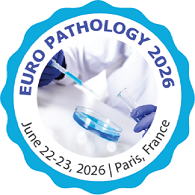Sessions & Tracks
Digital Pathology & AI in Diagnostics
Digital pathology integrates whole-slide imaging and computational tools to transform traditional pathology workflows. Artificial Intelligence (AI) enhances diagnostic precision by automating image analysis, enabling pattern recognition beyond human capacity. This track explores advances in AI-powered algorithms for disease detection, quantification of biomarkers, and prognostic assessments. Topics include the implementation of digital pathology in clinical laboratories, challenges in standardization, and regulatory frameworks. Sessions cover AI’s role in augmenting pathologists’ capabilities, reducing diagnostic errors, and accelerating workflow efficiency. The track emphasizes how digital pathology democratizes access to expertise, facilitating remote consultations and collaborative networks worldwide. Discussions also extend to AI's role in fusion with genomics and other omics data, pushing the frontier of precision medicine. This session highlights the transformative potential of digital pathology to improve patient outcomes and advance global health initiatives.
Molecular Pathology & Genomics
Molecular pathology underpins precision medicine through detailed characterization of genetic alterations in diseases. This track addresses cutting-edge technologies like next-generation sequencing (NGS), liquid biopsies, and in situ hybridization for detecting mutations, gene fusions, and epigenetic changes. Topics include biomarker discovery, molecular diagnostics in oncology, inherited diseases, and infectious agents. Sessions focus on integrating genomic data into clinical decision-making, standardization of molecular assays, and interpreting variants of unknown significance. The role of molecular pathology in drug development and companion diagnostics is highlighted, supporting tailored therapies that improve efficacy and minimize toxicity. Ethical, legal, and social implications of genomic testing also form key discussion points. The track advances understanding of molecular mechanisms driving disease and fosters development of novel diagnostic and therapeutic strategies.
Precision Medicine & Targeted Therapies
Precision medicine relies on accurate pathological assessment to guide targeted treatments tailored to individual patient profiles. This track emphasizes the implementation of biomarkers for patient stratification, monitoring therapeutic responses, and predicting outcomes. Coverage includes antibody-drug conjugates, immune checkpoint inhibitors, and personalized cancer vaccines. Sessions explore integrating multidisciplinary data—morphological, molecular, and clinical—to optimize therapy choice. Advances in neoadjuvant and adjuvant therapies, resistance mechanisms, and molecular tumor boards inform discussions. The track highlights challenges such as accessibility, cost-effectiveness, and equitable delivery of precision therapies worldwide. It aims to inspire innovative approaches that translate laboratory discoveries into transformative clinical interventions, ultimately enhancing patient survival and quality of life.
Cancer Pathology & Biomarkers
Cancer diagnosis and prognosis are evolving through the identification of novel biomarkers and molecular subtyping. This track investigates morphological and molecular features in common and rare malignancies, emphasizing diagnostic accuracy and reproducibility. Topics include tumor heterogeneity, immunohistochemical markers, and molecular signatures with clinical utility. Sessions cover advances in digital pathology applications, such as AI-assisted scoring and quantification of biomarkers like PD-L1, HER2, and Ki-67. The role of pathology in early detection, minimal residual disease monitoring, and predicting therapeutic responses forms a cornerstone of discussion. Emphasis is placed on harmonizing diagnostic criteria and guidelines to improve patient management and outcomes.
Infectious Disease Pathology & Emerging Pathogens
This track addresses pathological aspects of infectious diseases, including bacterial, viral, fungal, and parasitic infections. It focuses on emerging pathogens with epidemic potential, diagnostic challenges, and tissue response patterns. Discussions include histopathological features of infections, molecular and immunological diagnostic advances, and the impact of antimicrobial resistance. The track explores the role of pathology in outbreak investigation, vaccine development, and treatment monitoring. It highlights the importance of multidisciplinary approaches and global cooperation to tackle infectious threats affecting public health.
Immunopathology & Autoimmune Diseases
Immunopathology deals with diseases where immune dysregulation causes tissue damage, including autoimmune disorders and hypersensitivity reactions. This track covers advances in immunohistochemistry, molecular markers, and serological diagnostics. Topics include systemic lupus erythematosus, rheumatoid arthritis, vasculitis, and transplant rejection. Sessions focus on pathogenetic mechanisms, laboratory methods for diagnosis and monitoring, and therapeutic implications. The integration of novel biomarkers for disease activity and response to immunomodulatory therapies is emphasized. The track aims to improve understanding of immune-mediated diseases and promote precise diagnostic and therapeutic strategies.
Neuropathology & Neurodegenerative Disorders
Neuropathology focuses on the pathological basis of neurological diseases, including neurodegenerative disorders like Alzheimer’s, Parkinson’s, and multiple sclerosis. This track emphasizes molecular and immunohistochemical techniques for characterizing brain and spinal cord lesions. Topics include diagnostic challenges, biomarker development, and correlations with clinical phenotypes and imaging. Sessions explore innovations in neuro-oncology, infectious and inflammatory CNS diseases, and traumatic brain injury. The track highlights advances in digital pathology and AI for enhanced diagnostic accuracy and research applications.
Pediatric & Developmental Pathology
This track explores pathology in the pediatric population, encompassing congenital anomalies, neoplasms, and developmental disorders. Emphasis is placed on the unique pathological features and molecular underpinnings of childhood diseases. Sessions cover perinatal pathology, genetic syndromes, pediatric tumors, and ethical considerations in pediatric diagnostics. Advances in molecular diagnostics and their integration into clinical care improve understanding, early diagnosis, and targeted treatments. The track fosters collaboration between pathologists, pediatricians, and geneticists to enhance patient outcomes.
Pulmonary & Thoracic Pathology
Pulmonary pathology addresses diseases of the lungs, pleura, and thoracic structures, including malignancies, interstitial lung diseases, and infections. This track covers histopathological patterns, molecular biomarkers, and emerging diagnostic techniques. Sessions focus on lung cancer subtyping, targeted therapies, transplants, and rare thoracic tumors. Discussions include correlations with radiological and clinical data for comprehensive diagnosis. The track highlights advancements in digital pathology and AI applications in pulmonary disease assessment and precision medicine.
Gastrointestinal & Liver Pathology
This track addresses diseases of the gastrointestinal tract, liver, pancreas, and biliary system. Emphasis is on inflammatory, neoplastic, and infectious processes, using histopathology and adjunct molecular methods. Topics include colorectal cancer screening, liver fibrosis and cirrhosis, pancreatitis, and rare tumors. Sessions discuss standardization of diagnostic criteria and the impact of precision medicine on therapeutic decisions. Integration of pathology with endoscopic and radiological findings is promoted for holistic patient care.
Renal Pathology & Transplantation
Renal pathology focuses on kidney diseases including glomerulonephritis, tubular disorders, and transplant pathology. This track covers advances in biopsy techniques, immunofluorescence, and molecular assays for diagnostic precision. Sessions explore mechanisms of transplant rejection, tolerance, and complications. Biomarkers predicting renal disease progression and therapeutic responses are discussed. The track emphasizes integrating pathology findings with clinical nephrology to optimize patient management.
Cardiovascular Pathology
This track explores pathological changes in heart and vascular diseases, including atherosclerosis, cardiomyopathies, and vascular inflammation. Sessions focus on histopathological and molecular diagnostics, biomarkers, and autopsy studies. Advances in imaging correlation and digital pathology assist in disease characterization. The track aims to improve understanding of cardiovascular disease mechanisms and support development of precision therapeutic strategies.
Hematopathology & Bone Marrow Diseases
Hematopathology covers diseases of blood, bone marrow, and lymphoid tissues such as leukemias, lymphomas, and myeloproliferative disorders. This track discusses advances in morphology, immunophenotyping, cytogenetics, and molecular diagnostics. Topics include minimal residual disease monitoring, targeted therapies, and integrated diagnostic approaches. The role of digital pathology and AI in enhancing diagnostic accuracy is also covered. The track promotes multidisciplinary collaboration for patient-centered care.
Dermatopathology & Skin Cancers
This track addresses inflammatory and neoplastic skin diseases, including melanoma and non-melanoma skin cancers. Sessions focus on histological criteria, immunohistochemistry, and molecular profiling. Advances in early detection, prognostic markers, and targeted therapies are discussed. The track also covers non-neoplastic dermatoses, infectious mimics, and emerging diagnostic technologies. Integration with clinical dermatology is emphasized for optimal patient outcomes.
Women’s Health & Gynecologic Pathology
This track covers diseases of the female reproductive tract, including cancers, benign tumors, and inflammatory conditions. Emphasis is on molecular classification, biomarkers, and precision diagnostics. Topics include endometrial carcinoma, ovarian tumors, and cervical pathology. Sessions examine standardized reporting, therapeutic implications, and advances in minimally invasive diagnostics. The track fosters collaboration with gynecology and oncology teams to enhance women’s health care.
Digital Innovations in Laboratory Medicine
This track encompasses technological advancements transforming laboratory medicine such as automation, data analytics, and informatics. Topics include laboratory workflow optimization, quality assurance, and integration of digital tools for diagnostics. Sessions focus on interoperability, data security, and the role of AI in data interpretation. The track highlights how digital innovations improve diagnostic accuracy, turnaround times, and patient care.
Veterinary Pathology
Veterinary pathology deals with diseases affecting animals and their relevance to human health (zoonoses). This track covers infectious, neoplastic, and genetic diseases in domestic and wild animals. Advances in molecular diagnostics and comparative pathology are discussed. The track promotes One Health approaches, emphasizing interdisciplinary cooperation between human and veterinary medicine for global health.
Quality Control & Standardization in Pathology Labs
This track addresses the importance of quality assurance, accreditation, and standardized protocols in pathology laboratories. Topics include pre-analytical, analytical, and post-analytical quality control, proficiency testing, and regulatory compliance. Sessions discuss challenges in implementing uniform standards globally and strategies to improve reproducibility and diagnostic reliability. The track ensures pathology labs meet the highest standards to support precision medicine and patient safety.
Translational Pathology: Bridging Research & Clinical Practice
Translational pathology integrates basic science discoveries with clinical applications to improve diagnosis and treatment. This track covers biomarker validation, novel therapeutic targets, and innovative diagnostic platforms. Discussions emphasize multidisciplinary collaboration, clinical trials, and the pathologist’s evolving role in precision medicine. The track showcases successful examples of translational research impacting patient care and outlines future directions.
Global Health & Pathology in Resource-Limited Settings
This track focuses on challenges and solutions for delivering quality pathology services in low-resource environments. Topics include capacity building, affordable technologies, telepathology, and training programs. Sessions highlight the role of pathology in infectious disease control, cancer diagnosis, and public health surveillance. The track promotes global collaboration and equitable access to advanced diagnostics to improve health outcomes worldwide.






















